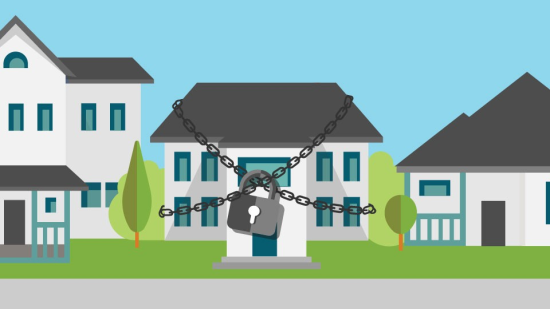
Keeping a vacant home safe and secure while it's on the market for sale is essential to protect the property from potential threats and maintain its appeal to potential buyers. There are several measures homeowners and real estate agents can take to ensure the property remains in good condition and deters any unwanted incidents.
1. INVEST IN A SECURITY SYSTEM
Firstly, it's crucial to invest in a reliable security system. A monitored alarm system with motion sensors and door/window contacts can provide an extra layer of protection. Visible security cameras can act as a deterrent to potential burglars, as they know their actions will be recorded. Signage indicating the presence of a security system can also discourage unwanted visitors.
2. MAINTAIN THE PROPERTY'S EXTERIOR
Maintaining the property's exterior is equally important. Regular lawn care, including mowing the grass and trimming bushes, gives the impression that the property is still actively cared for. If possible, consider installing timers for outdoor lighting to create the appearance that someone is home during evenings. Adequate outdoor lighting also enhances safety by reducing hiding spots for potential intruders.
3. SECURE DOORS AND WINDOWS
Securing doors and windows is a fundamental step in safeguarding a vacant home. Reinforce entry points with deadbolt locks, and consider installing security film on windows to make them more resistant to break-ins. If the property has sliding glass doors, add a bar or rod to prevent them from being forced open. Remove spare keys from outdoor hiding spots, as experienced criminals often check for these.
4. INSPECT REGULARLY
Regular inspections are essential to catch any issues early. Arrange for your Realtor, a trusted neighbor, friend, or a professional property manager to check on the property periodically. They can look for signs of forced entry, water leaks, or other potential problems and address them promptly. These visits also create the appearance of activity at the property, which can deter trespassers.
5. SECURE ACCESS
Secure access points to the property, such as gates and fences. Ensure they are in good repair and lockable. If there are multiple access points, consider blocking off some to limit potential entryways for unauthorized individuals. Reinforce the garage door as well, as it can be a vulnerable point of entry.
6. INTERIOR
Keep the interior clean, well-lit, and free of clutter. An unkempt interior can suggest neglect and attract unwanted attention. Consider staging the property with minimal furniture and decor to showcase its potential while making it less inviting to trespassers.
7. CONSIDER STAGING THE HOME
If you recently house hunted, you know how challenging it is to look beyond a homeowners' taste in décor and furnishings to imagine your own stuff in the home.
It's even more challenging in a vacant home. Whether it's because most of us lack the imagination they require or some other reason, studies prove that a vacant home will sit on the market for nearly 80 percent longer than a furnished home.
Even partially staging the home will it help sell quicker.
8. LEAVE THE UTILITIES ON
Since you are leaving the home vacant, and on the market, transferring utilities is a bit more complicated. You'll need to keep the power, water and gas in service to the vacant home for showings and the home inspection.
Cancel the services once the home closes escrow.
9. CALL YOUR INSURANCE AGENT
The folks at ValuePenguin.com claim that most homeowner insurance policies stop covering claims on homes that have been vacant for more than 30 days.
Contact your insurance agent to find out if you're covered and, if not, how to purchase vacant home insurance.